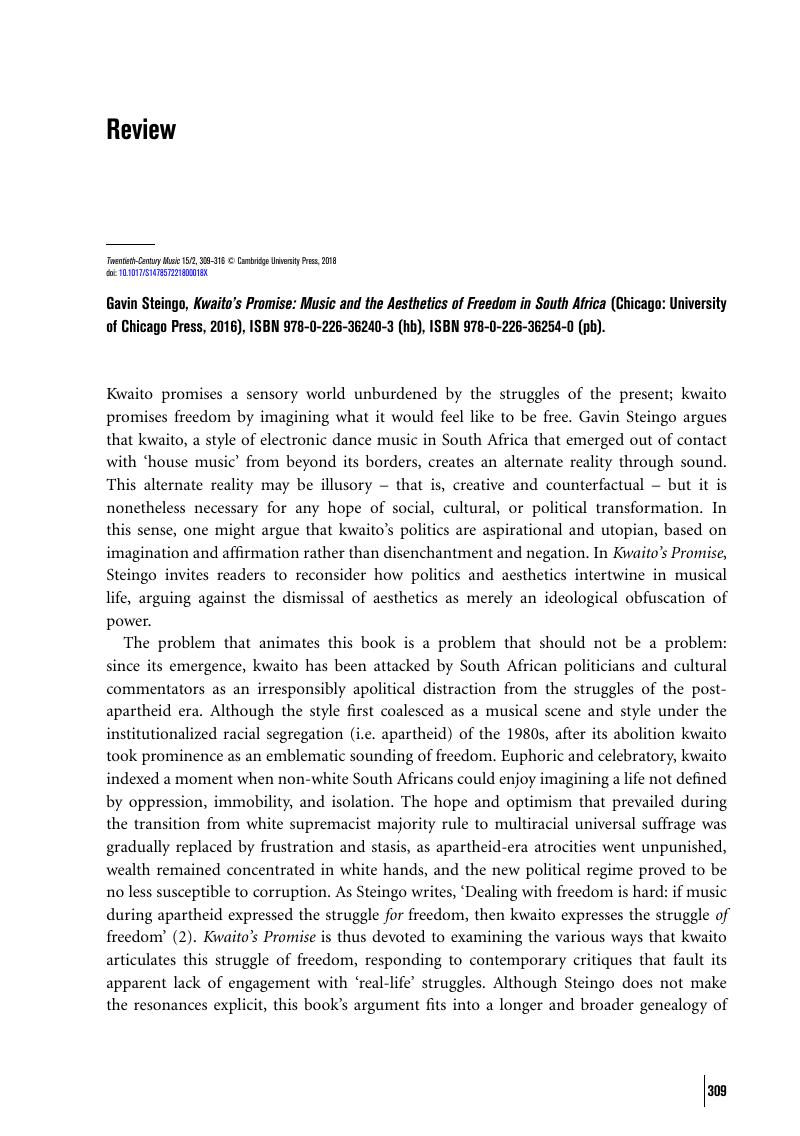No CrossRef data available.
Published online by Cambridge University Press: 15 August 2018

1 On utopian transcendence, see Bloch, Ernst, The Principle of Hope, 3 vols., trans. Plaice, Neville, Plaice, Steven, and Knight, Paul (Cambridge, MA: MIT Press, 1938–47; repr., 1986)Google Scholar; Dolan, Jill, ‘Performance, Utopia, and the “Utopian Performative”’, Theatre Journal 53/3 (2001), 455–79CrossRefGoogle Scholar; Dyer, Richard, ‘Entertainment and Utopia’, Movie 24 (1977), 2–13Google Scholar; Jameson, Fredric, ‘Reification and Utopia in Mass Culture (1979)’, in Signatures of the Visible (New York: Routledge, 1990), 11–46Google Scholar; Muñoz, José Esteban, Cruising Utopia: The Then and There of Queer Futurity (New York: New York University Press, 2009)Google Scholar.
2 For postcolonial imagination and cosmopolitanism, see Appadurai, Arjun, Modernity at Large: Cultural Dimensions of Globalization (Minneapolis: University of Minnesota Press, 1996)Google Scholar; Beck, Ulrich, The Cosmopolitan Vision, trans. Cronin, Ciaran (Cambridge: Polity, 2006)Google Scholar; Delanty, Gerard, The Cosmopolitan Imagination: The Renewal of Critical Social Theory (Cambridge: Cambridge University Press, 2009)CrossRefGoogle Scholar; Dent, Alexander Sebastian, River of Tears: Country Music, Memory, and Modernity in Brazil (Durham, NC: Duke University Press, 2009)CrossRefGoogle Scholar; Gibson, Nigel C., Fanon: The Postcolonial Imagination (Cambridge: Polity, 2003)Google Scholar; Go, Julian, ‘Fanon's Postcolonial Cosmopolitanism’, European Journal of Social Theory 16/2 (2013), 208–25CrossRefGoogle Scholar; Holton, Robert J., Cosmopolitanisms: New Thinking and New Directions (Basingstoke: Palgrave Macmillan, 2009)CrossRefGoogle Scholar; Landau, Loren B. and Freemantle, Iriann, ‘Tactical Cosmopolitanism and Idioms of Belonging: Insertion and Self-Exclusion in Johannesburg’, Journal of Ethnic and Migration Studies 36/3 (2010), 375–90CrossRefGoogle Scholar; Martel, James R., The Misinterpellated Subject (Durham, NC: Duke University Press, 2017)CrossRefGoogle Scholar.
3 Some examples of recent studies that tackle politics and aesthetics in music: Guilbault, Jocelyne, ‘Discordant Beats of Pleasure Amidst Everyday Violence: The Cultural Work of Party Music in Trinidad’, MUSICultures 38 (2011), 7–26Google Scholar; ‘Politics of Ethnomusicological Knowledge Production and Circulation’, Ethnomusicology 58/2 (2014), 321–6; Henriques, Julian, Sonic Bodies: Reggae Sound Systems, Performance Techniques, and Ways of Knowing (New York: Continuum, 2011)Google Scholar; Manabe, Noriko, The Revolution Will Not Be Televised: Protest Music after Fukushima (New York: Oxford University Press, 2015)Google Scholar; Stokes, Martin, The Republic of Love: Cultural Intimacy in Turkish Popular Music (Chicago: University of Chicago Press, 2010)CrossRefGoogle Scholar.
4 Bourdieu, Pierre, Distinction: A Social Critique of the Judgement of Taste, trans. Nice, Richard (Cambridge, MA: Harvard University Press, 1984)Google Scholar.
5 Rancière, Jacques, The Politics of Aesthetics: The Distribution of the Sensible, trans. Rockhill, Gabriel (London: Continuum, 2004).Google Scholar See also ‘Thinking between Disciplines: An Aesthetics of Knowledge’, Parrhesia 1 (2006), 1–12; Aisthesis: Scenes from the Aesthetic Regime of Art, trans. Paul Zakir (London: Verso Books, 2013).
6 Rancière, ‘Thinking between Disciplines’, 3.
7 For an overview of this debate, with an emphasis on Bourdieu and Rancière, see Sonderegger, Ruth, ‘Negative Versus Affirmative Critique: On Pierre Bourdieu and Jacques Rancière’, in Conceptions of Critique in Modern and Contemporary Philosophy, ed. de Boer, Karin and Sonderegger, Ruth (London: Palgrave Macmillan UK, 2012)Google Scholar.
8 Bourdieu, Distinction, 493.
9 Adorno, Theodor W., Aesthetic Theory, ed. Adorno, Gretel and Tiedeman, Rolf, trans. Hullot-Kentor, Robert (Minneapolis, MN: University of Minnesota Press, 1997)Google Scholar; Rancière, Aisthesis: Scenes from the Aesthetic Regime of Art.
10 Gautier, Ana María Ochoa, Aurality: Listening and Knowledge in Nineteenth-Century Colombia (Durham, NC: Duke University Press, 2014)Google Scholar.
11 Althusser, Louis, Machiavelli and Us, ed. Matheron, François, trans. Elliott, Gregory (London: Verso, 1999)Google Scholar.
12 Bloch, The Principle of Hope; Dolan, ‘Performance, Utopia, and the “Utopian Performative”’; Muñoz, Cruising Utopia.